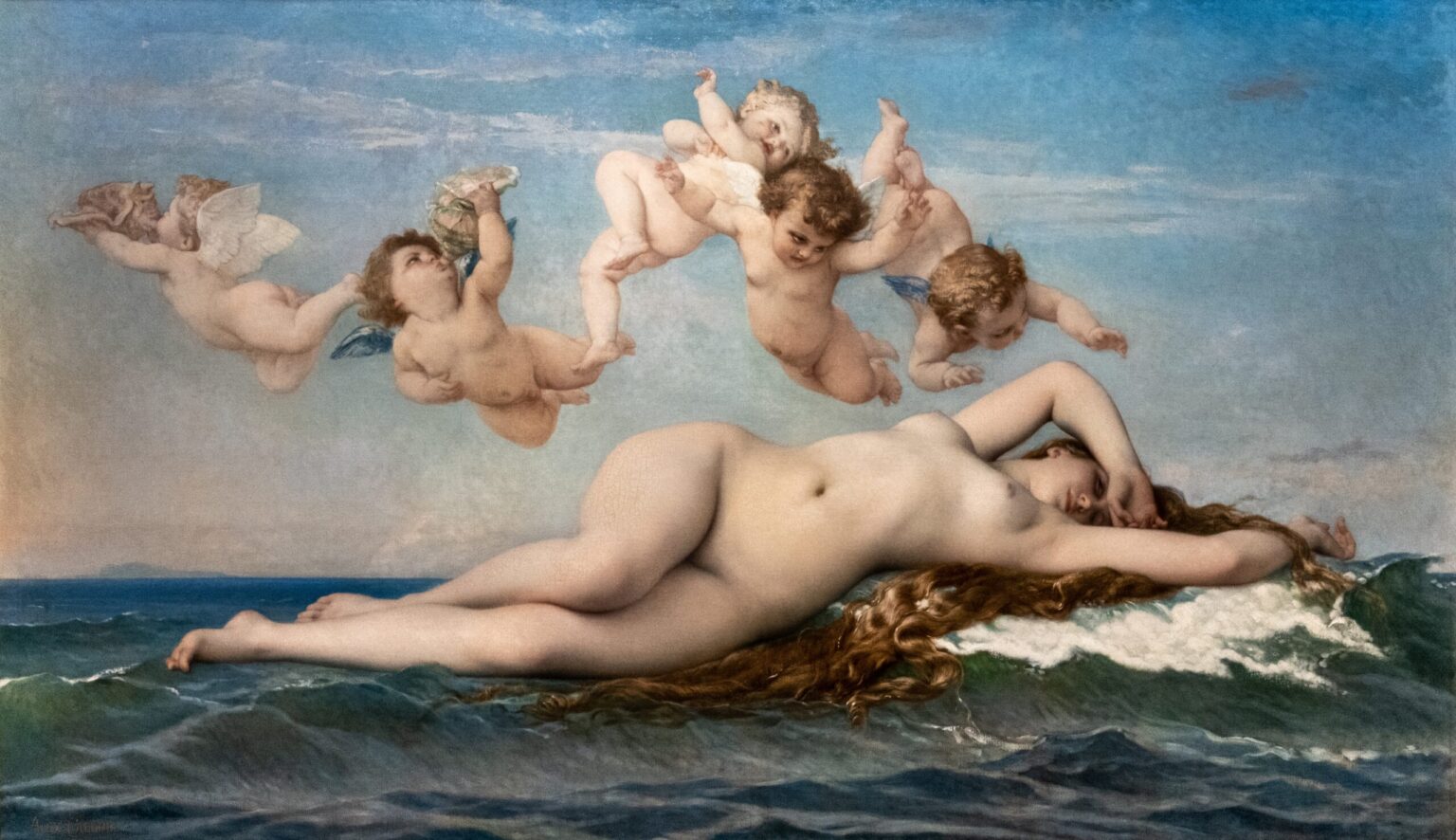L’affaire de Conservative Dad’s Ultra Right Beer limited-edition Real Women of America 2024 pinup calendar—what many are calling the culture war battle of our time.
You’d be hard pressed to find a better encapsulation of today’s American right: Conservative Dad’s Ultra Right Beer—the red-blooded American patriot’s answer to Bud Light—releases a cringe-inducing “Real Women of America” bikini girl pinup calendar, ostensibly to raise proceeds “to protect women’s sports from extreme leftist ideology seeking to destroy real women.” The calendar, which features assorted ladies of conservatism at varying stages of less-than-fully clothed—activist Riley Gaines, Twitter personality Ashley St. Clair, failed congressional candidates Kim Klacik and Catalina Lauf, and so on—sparks outrage from the social-conservative corner of Twitter. Shots fly, the smell of gunsmoke fills the cold digital airwaves, and right-wingers retreat to their respective online bunkers to triumphantly declare that the calendar, and the ensuing debate it sparked, decisively confirms all of their ideological priors. Forty-eight hours later, everyone moves on to Nikki Haley’s comments on the causes of the Civil War.
In the abstract, calendars with pictures of women in bikinis aren’t much to write home about. While healthy, virtuous societies took reasonable measures to disincentivize or suppress them, pictures (or paintings, or cave drawings) of pretty women minus a few articles of clothing have been a constant feature of human society since Adam’s rendezvous with the apple. That’s not to say that smut is good. (One might point out that murder and rape have been constant and universal features of human society, too.) But in our rapidly degenerating culture, bikinis are low on the totem pole of concerns. Causes such as the right’s laudable crusade against actual pornography—including within its own ranks—are likely to be a much more profitable use of conservative time and energy.
Then again, the Real Women of America calendar was exceptionally off-putting. As its critics pointed out, it came from—and was marketed for—conservatives. It’s one thing to reluctantly accept that somewhere, somebody is buying an edition of Playboy in the back of a seedy corner store; it’s quite another to market your own version while wearing the skinsuit of the political movement that claims to advocate for a more virtuous culture. The women in the calendar were not selected for their background in modeling, but because of their conservative political activism. They were on the calendar as representatives of conservatism. Some of them were married. The entire endeavor was a bewildering example of how-do-you-do-fellow-kids conservatism—a ham-handed right-wing effort to be hip, relatable, in touch with the spirit of the age. It’s difficult not to feel a certain amount of secondhand embarrassment for everyone involved.
Many of the calendar’s critics, however, veered into much more bizarre territory. Multiple anti-calendar crusaders described the pinup as “demonic.” Its apologists were accused of “drinking the kool aid of the Sexual Revolution.” At least one critic complained that the calendar “doesn’t feature any pregnant women or photos of women with their kids,” and countered that “a real Real Conservative Women calendar” would feature pictures of ladies with a visible baby bump—somehow an even more disconcerting concept than the original compilation of scantily clad Republicans.
The entire affair—both the calendar and its conservative critics—reveals something important about the contemporary right’s aesthetic sensibilities. Locked in a bitter rearguard action for the last remnants of what was once American culture, exiled from the institutions that create and preside over the means of cultural production, conservatives no longer have the foggiest idea of what a “culture” actually is, let alone what it would take to shape one. Instead, the right contents itself with a sort of hysterical schoolmarmishness, working itself into a lather over relatively minor aesthetic questions while ignoring the deeper values and normative ideas at the center of the real battle.
Writing on the conservative crusade against Hollywood back in 1995, the paleoconservative columnist Sam Francis noted that “the only objection” that anyone “on the American right ever raises to any film is that it ‘glorifies sex and violence.’” But “what far less bloody films that no one on the right pays much attention to often say about the nature of man, society, and the universe is often far more degraded and dangerous than a few scenes of improbable shootouts and bedroom wrestling matches,” he argued. The right hadn’t cared to notice, because professional conservatives had “little interest in anything that doesn’t affect politics and the pocketbook”:
Immersed in an essentially hedonistic and economic worldview that recognizes nothing more important than material self-interest, the right is unable to form or even comment intelligently upon a culture, a normative way of life that transcends and shapes the pursuit of both power and money rather than being shaped by them. Hence, all that the right, religious or Republican, wants from culture is for it not to offend whatever habitual prejudices and tastes they happen to retain. The best kind of culture for them is what they think prevailed in the 1950’s, when Pat Boone and Fabian crooned nothing that disturbed their affluent slumbers and Lucy and The Beaver reconfirmed every week the eternal virtues of an already crumbling nuclear family where the father figure was an object of ridicule whose authority was to be evaded and undermined.
With some notable exceptions, what passes for movement conservatism today consists largely of useless ideological fixations, fourth-rate grifts, and decrepit institutions with little to no memory of their original meaning and purpose. It’s no wonder, then, that the best today’s right can muster is cheap, lower-quality inversions of the slop they’re fed from the incumbent culture: A right-wing alternative to Bud Light. A patriotic rival to Starbucks. A chocolate bar that, contra Hershey’s, upholds the gender binary. An anti-woke Playboy pinup calendar.
Instead of creating an authentic counterculture — one that might someday be able to challenge the hegemony of our decaying mainstream institutions — conservatives are locked in a dialectic relationship with the very social norms and mores that they ostensibly seek to overcome. The narrow ideological frame that the right operates in permits only a long, unending line of “conservative alternatives to [X],” reproducing the values and animating assumptions of the dominant culture with a thin coat of right-wing policy priorities painted on top. An anti-trans Bud Light is still, in essence, Bud Light. An anti-woke Playboy is still, in essence, Playboy.
The truth is that many of today’s conservative cultural entrepreneurs see no fundamental problem with soulless, amoral films and music. Nor do they have any substantive objection to cheap consumer junk that serves no purpose other than material acquisition; faceless, placeless corporate behemoths that devour Main Street corner stores, shops, and community centers; or a mass media that hypnotizes Americans with meaningless diegeses of their favorite celebrity’s sexual exploits as their country is transformed into a gigantic shopping mall. So long as these institutions make an obligatorily snide remark about “wokeness” having gone too far, or throw in a favorable reference to the genius of Ronald Reagan, we will have won the culture war.
If it’s not apparent by now, this brand of “conservatism,” and the individuals who are responsible for perpetuating it, are not going to help us find our way home. A new culture, oriented around radically different values, would require art, films, music, and products that are wholly independent from the ones that govern American society today. The greatest “conservative” films are not self-consciously political at all. They are not about tax cuts, abortion, or PC culture run amok, nor are they repurposed Hollywood plots with clumsy anti-transgender storylines inserted somewhere along the way. They were works of art — true art, rather than right-wing PR campaigns packaged as such — that implied conservative answers to universal questions: family, duty, patriotism, God, the nature and purpose of man.
Forget the conservative pinup calendars. Leave aside the campaign to cleanse the world of pictures of girls in bikinis. America needs art that tells a story about who we are and where we come from; films that teach clean and obvious moral distinctions between good and evil; music that glorifies loyalty to family, nation, and God; and a class of businessmen and entrepreneurs who can strive for the heroism, restless dynamism, and creative spirit that drove Americans to build a civilization from the savage wilderness of an untamed continent. It was here, in this country, that the West fulfilled its destiny. Our ancestors conquered a wild frontier, raised up great cities, dreamed the power of flight into existence, and sent men to the moon. We can do better than online spats over bikini calendars.
Read the full article here














